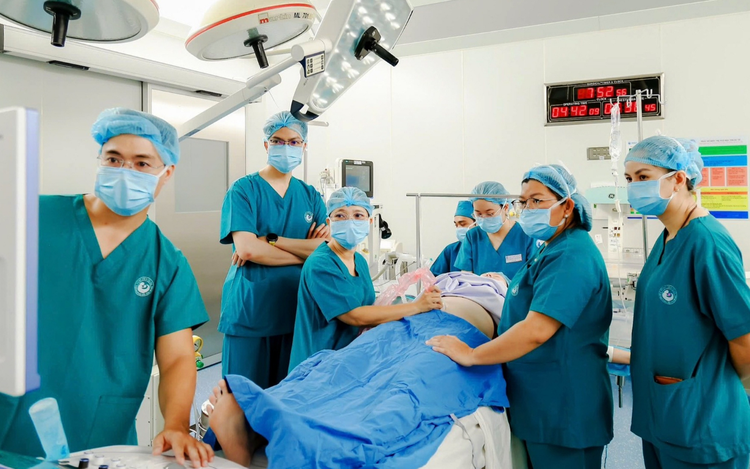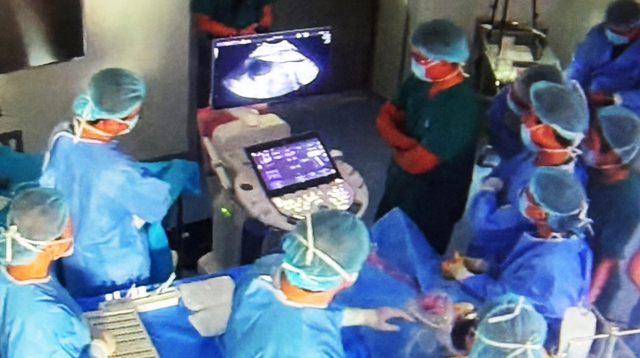
Doctors from Tu Du Hospital and Children’s Hospital 1 in Ho Chi Minh City check the health of a Singaporean mother before performing a complex cardiac intervention on her 22-week-old fetus. Photo: Supplied
This achievement highlighted Vietnam's growing expertise in fetal medicine.
The latest case involved a 41-year-old Singaporean expectant mother, K.W.S., whose unborn baby was diagnosed with a severe congenital heart defect that carried a high risk of stillbirth.
The patient was referred by KK Women's and Children's Hospital in Singapore to Ho Chi Minh City for treatment, due to the unavailability of this advanced procedure in Singapore.
Dr. Tran Ngoc Hai, director of Tu Du Hospital, described the decision to pause the initial procedure as ‘extremely difficult,’ reflecting the high stakes and intricate considerations involved.
Meanwhile, Dr. Do Nguyen Tin, head of the interventional cardiology unit at Children’s Hospital 1, noted that the stress level was significantly higher due to the patient being foreign and the complexity of the condition.
Although this was the ninth fetal cardiac intervention performed in the city, it was by far the most difficult, due to the fetus' early gestational age and low weight of only 600 grams.
The first attempt, conducted on May 22, was unsuccessful.
However, after extensive preparation and close coordination across specialties, a second attempt on Wednesday succeeded.
The successful surgery deeply moved the mother and her family.
She expressed heartfelt gratitude to the Vietnamese doctors and nurses who not only saved her baby but also supported the family through language barriers and emotional stress.
Her husband described the experience as ‘a miracle.’
The case demonstrated Vietnam’s capabilities in fetal medicine.
A leading Singaporean hospital’s decision to refer the patient to Vietnam underlined the trust in Vietnamese doctors’ expertise and elevated the country’s status within ASEAN’s medical community.
Given the recent successes, Vietnamese patients no longer need to travel abroad for complex fetal interventions.

Doctors from Tu Du Hospital and Children’s Hospital 1 in Ho Chi Minh City perform a complex cardiac intervention on a 22-week-old fetus of a Singaporean mother. Photo: Supplied
Vietnamese medical services become magnet for foreigners
Not only in fetal medicine, but over the past few years, many foreign patients have also traveled to Vietnamese hospitals for laparoscopic surgery and in vitro fertilization (IVF).
Dr. Dang Huy Quoc Thinh, former deputy director of Ho Chi Minh City Oncology Hospital, expressed pride in the ability of doctors from Tu Du Hospital and Children’s Hospital 1 to perform fetal cardiac interventions.
The country has also become increasingly attractive for foreign patients seeking procedures such as laparoscopic surgery and in vitro fertilization (IVF), he told Tuoi Tre (Youth) newspaper on Thursday.
Dr. Thinh emphasized that IVF in Vietnam has matured rapidly.
Dr. Ho Manh Tuong, general secretary of the Ho Chi Minh City Society for Reproductive Medicine, said that Vietnam now leads the ASEAN region in IVF techniques, and is among the nations with highly advanced IVF development worldwide.
Also, the field of laparoscopic surgery, especially in gastrointestinal and neurosurgical procedures, has advanced considerably, Dr. Thinh said.
Major hospitals such as Binh Dan, Cho Ray, and the University of Medicine and Pharmacy at Ho Chi Minh City regularly host training sessions for regional doctors from Thailand, Malaysia, Singapore, Indonesia, the Philippines, and beyond.
Despite these achievements, Dr. Thinh stressed the need to address challenges such as hospital overcrowding and equitable access to healthcare if Vietnam aims to build a sustainable and robust healthcare system.
Northern Vietnam to have first fetal medicine center
Nguyen Duy Anh, director of the National Hospital of Obstetrics and Gynecology, said that the Ministry of Health had issued a decision allowing the hospital to establish a fetal medicine center.
Over the past two years, the hospital has sent medical teams for training in techniques to diagnose, intervene, and treat unborn babies in the womb.
He also noted that it will be the first fetal medicine center in the northern region.
"In the past, we did not have the technical capability to treat babies with medical conditions before birth.
“However, now, we are able to insert a camera for diagnostic purposes and use endoscopic instruments to perform treatments for conditions such as cardiac abnormalities, twin-to-twin transfusion syndrome, oligohydramnios, and diaphragmatic hernia,” he stated.


Max: 1500 characters
There are no comments yet. Be the first to comment.